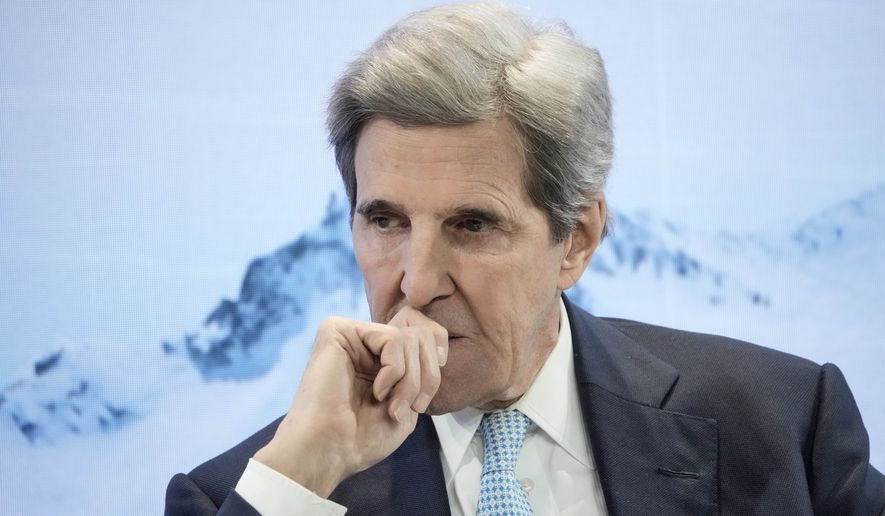Climate change was a pillar of this week’s annual World Economic Forum, a recurring theme that featured gloom-and-doom warnings from global business and political elites who gathered in Davos, Switzerland, to discuss pressing issues facing society.
Several prominent speakers voiced alarmist rhetoric because countries have backslid on climate pledges in the face of volatile energy markets. However, some attendees jetted to the meeting in private airplanes.
White House Climate Envoy John Kerry praised the attendees for being “extraterrestrial” in their pursuit of “saving the planet,” at one point equating climate change to World War II.
“It’s pretty extraordinary that we, a select group of human beings… are able to sit in a room and come together and actually talk about saving the planet,” he said. “It’s so, almost extraterrestrial, to think about saving the planet. If you said that to most people, most people would think you’re just a crazy tree-hugging, lefty-liberal do-gooder.”
Mr. Kerry said time was running out to prevent the planet from warming beyond a 1.5-degree Celsius threshold set by the international community that would bring irreparable damage.
“I am not convinced we can get there in time to do what the scientists said, which is avoid the worst consequences of the crisis. Those worst consequences are going to affect millions of people all around the world,” he said.
Former Vice President Al Gore tried to make a connection between xenophobia and climate change, which he said is set to create 1 billion refugees this century.
“Look at the xenophobia and political authoritarian trends that have come from just a few million refugees,” Mr. Gore said. “What about a billion? We would lose our capacity for self-governance on this world. We have to act.”
Speaking at the 2020 World Economic Forum, Mr. Gore had compared climate change to the 9/11 terrorist attacks and historical battles, including the Battles of Thermopylae, Agincourt, the Bulge and Dunkirk.
Johan Rockström, director of Germany’s Potsdam Institute for Climate Impact Research, suggested the Earth is “facing something deeper” than simply a climate crisis — “mass extinction, air pollution, undermining ecosystem functions, really putting humanity’s future at risk.”
“This is a planetary crisis,” he said.
Joyeeta Gupta, professor of environment and development in the global south at the University of Amsterdam, labeled it a safety and justice crisis.
“Many areas in the world are uninhabitable,” she said. “This uninhabitable zone is increasing. If we continue with our greenhouse gas emissions, then by 2070, as many as 3 billion people will live in uninhabitable zones, and mostly in poorer countries.”
Conservative critics note that the most extreme and dire environmental predictions stretching back decades have failed to become reality.
Attendees were also put on blast by green activists for “ecological hypocrisy,” who at one point blocked a private jet airport used by forum-goers.
Private planes at last year’s World Economic Forum accounted for more than 1,000 trips to airports serving the Swiss mountain resort, or emissions equivalent to about 350,000 cars, a Greenpeace International study found. That’s twice as many private jets going to and from the region compared with an average week, said the report, which was published last week.
“The rich and powerful flock to Davos in ultra-polluting, socially inequitable private jets to discuss climate and inequality behind closed doors,” said Klara Maria Schenk, a campaigner for Greenpeace. “This annual private jet bonanza is a distasteful master-class in hypocrisy… It’s about time our political leaders start to lead by example instead of producing hot air in secret meetings with big business.”
• Ramsey Touchberry can be reached at rtouchberry@washingtontimes.com.




Please read our comment policy before commenting.